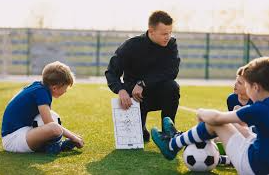Two stirring articles chronicling two very different characters involved in two contrasting sports, both at the highest level, appeared on the BBC Sport website on 20 July 2020 and considered a universal theme. One character is the manager of an English soccer team; the other is an athlete looking back on her experience winning the 800m and 1500m gold medals at the Olympic Games. In the articles, both spoke about success and failure.
Marcelo Bielsa is a highly respected coach with great experience at the top level in many different countries who humbly took on the role of manager of Leeds United Football Club, a team that has been languishing in the second tier of English soccer for sixteen seasons; at the end of his first season there he failed at the last hurdle to gain promotion to the promised land of the English Premier League, having been all set to do so, but he was willing to stay on and now has not only helped them to gain promotion but also brought them the Championship title. In the article, Bielsa is quoted as saying, “Being successful deforms us as human beings, it relaxes us, it plays tricks on us, it makes us worse individuals, it helps us fall in love with ourselves. Failure is the complete opposite, it forms us, it makes us more solid, it brings us closer to our convictions, it makes us more coherent.”
The second article shared how, at the 2004 Olympic Games in Athens, Kelly Holmes became only the third woman in history to win the 800m and 1500m Olympic double. Everyone saw the glory and the success; few ever saw the hurt and torment. She opened up about how she suffered numerous potentially career-ending injuries yet carried on, while also experiencing more seriously deep depression and mental anguish, to the extent that she regularly committed self-harm: “Every night away from the cameras and microphones I would be in the depths of despair, hating my life and hurting myself.” She looked at it all and concluded that, “Somebody being better than you isn’t failure. You only fail if you don’t do something, if you give up.”
The point of this article is simply this: what do we teach our children regarding success and failure when we coach them sport? Do we teach them anything? We coach them to be successful but how much time and teaching do we give them in handling all that comes with the success and failure?
Do we explain to them how dangerous success can be? Do we warn them, equip them, prepare them for all that comes with apparent success? Do we share with them exactly how success could “deform us as human beings”? Do we highlight how success could make us worse individuals (full of arrogance, selfishness, vanity, greed, jealousy, anger, entitlement, to name just a few for starters)? Do we ever mention the tricks success plays on us (assuming we ourselves know)?
Do we emphasise the tremendous value that failure can actually provide for the growth, progress and strength of the child? Do we emphasise what a wonderful learning opportunity it provides? Do we point out that “Somebody being better than you isn’t failure”? Do we highlight that we only fail if we give up? Do we go through the steps to show how failure “forms us, makes us more solid, brings us closer to our convictions, makes us more coherent”?
Or do we just simply expect them to handle it all without any assistance? Even mature adults like Kelly Holmes struggle with it. How can we expect young, vulnerable children to cope? If we do not do this, who will? If we are honest, the answer to the above questions is probably that in fact we do not explain, warn, prepare or equip them. Rather when the child succeeds, we delight in their glory, boast of their prowess, bask in their reflected honour, reward their achievements (awarding them Colours with special badges or blazers to set them even further apart from others, thus boosting their egos even further). When the child fails, we berate them (some may even beat them), harangue them, lecture them about disgracing the school. We hide them, muzzle them, give up on them. We fail them. In doing all of this, success has actually deformed us and played its tricks on us. We have so much to learn about what we must teach; what we teach will define whether we ourselves are a success or a failure and what we do with it will determine what sort of character we are. Have we learned that?




